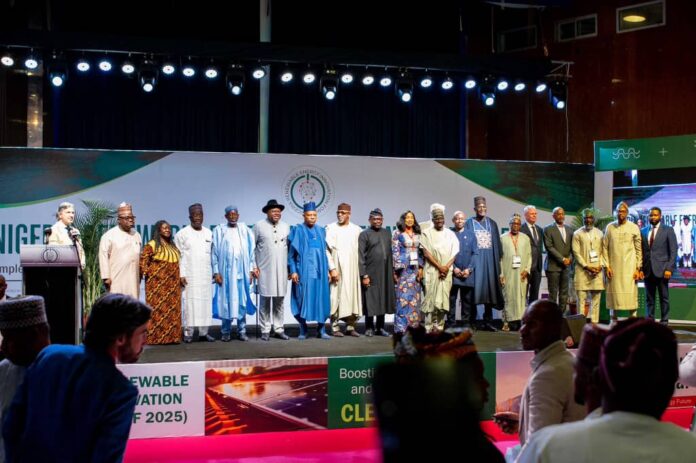The federal government has hinted that over $400 million in new renewable energy investment commitments will be formalised within the next two days to strengthen Nigeria’s renewable energy manufacturing value chain.
Vice President Kashim Shettima announced this on Tuesday at the inaugural Nigerian Renewable Energy Innovation Forum 2025 held in Abuja, saying the move is aimed at deepening local manufacturing and innovation in Nigeria’s renewable energy sector.
According to him, the investments, mobilised through engagements facilitated by the forum, will fund the establishment of solar panel assembly plants, smart meter production lines, and battery storage and recycling facilities across multiple states.
He said this is part of efforts to reverse the trend of solar panels importation in the last few days and strengthen local manufacturing in line with the Nigeria First policy of the current administration.
“Over the next two days, agreements will be signed, partnerships will be forged, and a national roadmap consolidated. I am pleased to announce that through the engagements facilitated under this forum, more than $400m in new investment commitments have been mobilised into Nigeria’s renewable energy manufacturing value chain. These include solar panels, smart meters, battery storage, and recycling facilities.
He added that the projects are expected to create more than 1,500 direct jobs and demonstrate growing global confidence in Nigeria’s clean energy industrialisation drive.
“These investments are projected to create over 1,500 direct jobs across multiple states and reflect growing global confidence in Nigeria’s clean energy industrialisation drive. I am convinced that each of us gathered here is determined to ensure that the outcomes of this forum do not end in communiqués but are translated into factories, jobs, electrified schools, thriving rural enterprises and resilient communities powered by clean energy.”
The Vice President noted that the success of Nigeria’s energy transition would not be measured by “the arrogance of our policies or the ambition of our projections,” but by the nation’s ability to transform ideas in driving practical, affordable and sustainable energy solutions for all Nigerians.
He stressed that the forum, themed “Implementing the Nigeria PACE Policy: Facilitating Local Content Development and Manufacturing in the Renewable Energy Ecosystem”, was conceived to drive local innovation and industrial participation in the transition to clean energy.
Shettima said Nigeria’s energy transition presented an investment opportunity of over $410bn between now and 2060, with $23bn required in the short term to expand energy access and connect millions of Nigerians still living in energy poverty.
Beyond access, he explained, the Federal Government’s long-term goal is to develop a power system with 277 gigawatts of installed capacity by 2060, anchored on innovation, investment, and local content.
“This is an invitation to establish Nigeria as the hub for renewable energy manufacturing in Africa. Nigeria’s energy transition presents an investment opportunity of over 410 billion U.S. dollars between now and 2060.
“Of this, more than 23 billion dollars is required to expand energy access and connect the millions of Nigerians who still live in energy poverty. But beyond access lies our grander ambition, which is to deliver a power system capable of 277 gigawatts of total installed capacity by 2060. This ambition demands more than investment.
“This ambition demands more than investment; it demands innovation, local capacity, and commitment,” Shettima said. “From solar panel assembly lines in Lagos to battery recycling hubs along our industrial corridors, Nigeria must not only participate in this revolution but lead it.”
The Vice President reaffirmed President Tinubu’s commitment to consolidating energy transition policies by enhancing incentives for local manufacturing, streamlining regulatory frameworks, and deepening collaboration with state governments, investors, and development partners.
He commended the Federal Ministry of Power and the Rural Electrification Agency for advancing decentralised, inclusive, and competitive energy policies that have brought electricity to underserved communities.
Shettima emphasised that Nigeria’s clean energy ambitions would not thrive without active private sector participation and collaboration from subnational governments.
He called on state governments, investors, and development partners to localise technology, strengthen value chains, and invest in skills and knowledge transfer to accelerate the country’s renewable industrialisation.
“We count on our state governments to champion renewable energy industrial processes and serve as engines of green growth across the federation,” he said. “Over the next two days, agreements will be signed, partnerships forged, and a national roadmap consolidated. This forum must prove that it is here for action, not mere deliberations.”
The vice president reaffirmed that Nigeria possessed all the fundamentals, minerals, manpower, and market potential to lead Africa’s clean energy revolution.
He described the country’s young population as its biggest asset, noting that Nigeria was well-positioned to become the “vibrant heartbeat of Africa’s renewable energy revolution.”
“We have too much at stake to be left behind,” Shettima said. “Nigeria is ready to harness her resources, unlock her capital, and lead Africa’s green industrial revolution.”
He also assured Nigerians that the current economic pains were temporary and that the government’s reforms were already steering the economy towards sustainable growth and stability.
“Our economy has turned the corner. The pains of saturation will soon be over,” he said. “We are on a path to sustainable growth, and there is a silver lining on

